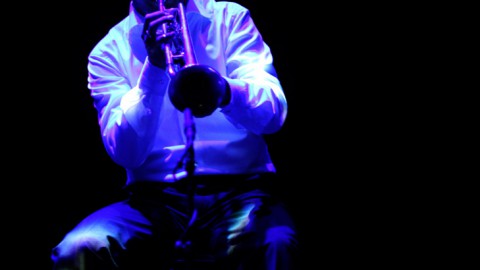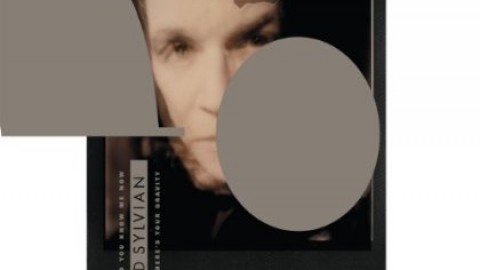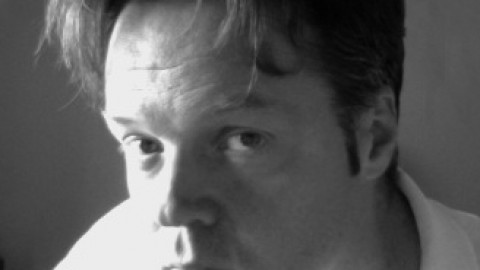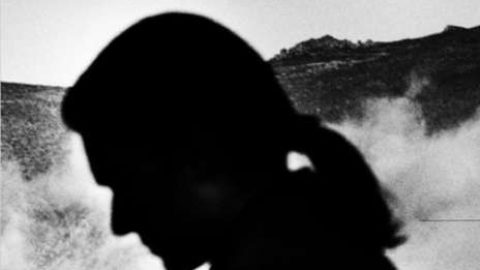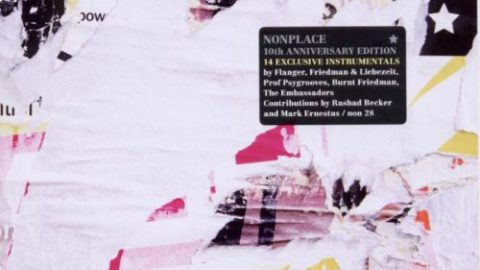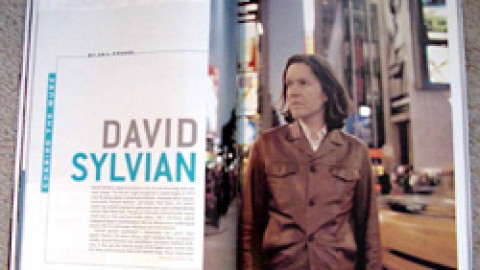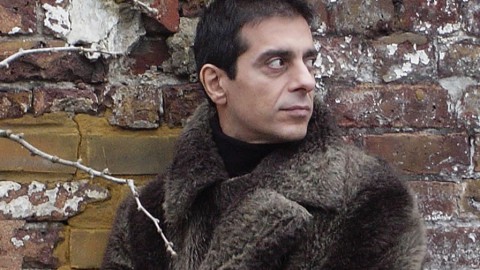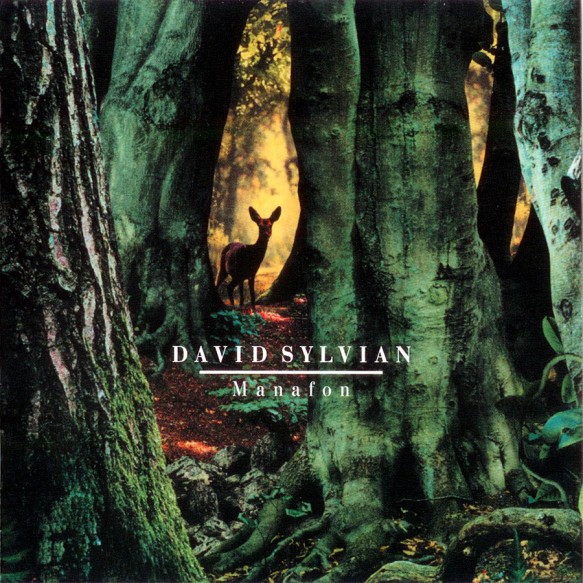
The new 9 track album from David Sylvian, which is scheduled to be released September 14th, is called Manafon. See below for tracklist and press information and artwork.
Samadhi Sound wrote on davidsylvian.com:
Manafon’s release date is set for Sept 14th. Manafon will be available in two editions. A regular CD/digipak edition and a twin volume deluxe edition with CD and DVD featuring the film ‘Amplified Gesture’. Details and new David Sylvian website to follow soon.
David himself describes it as:
a completely modern kind of chamber music. Intimate, dynamic, emotive, democratic, economical.
Tracklist
1. Small Metal Gods (5:49)
music: dafeldecker/fennesz/moser/stangl/sylvian lyrics: sylvian guitar: burkard stangl acoustic bass: werner dafeldecker cello: michael moser laptop, guitar: christian fennesz no-input mixer: toshimaru nakamura turntables: otomo yoshihide vocals: david sylvian
2. The Rabbit Skinner (4:42)
music: fennesz/mattos/parker/ryan/sylvian/tilbury lyrics: sylvian piano: john tilbury saxophone: evan parker cello: marcio mattos laptop guitar: christian fennesz live signal processing: joel ryan vocals, acoustic guitar: david sylvian
3. Random Acts Of Senseless Violence * (7:06)
music: dafeldecker/fennesz/moser/rowe/sylvian lyrics: sylvian guitar: keith rowe piano: john tilbury acoustic bass: werner dafeldecker cello: michael moser laptop, guitar: christian fennesz turntables: otomo yoshihide trumpet: franz hautzinger vocals, keyboards, acoustic guitar: david sylvian
4. The Greatest Living Englishman (10:55)
music: akiyama/sachiko m/nakamura/yoshihide/sylvian lyrics: sylvian electric and acoustic guitar (left channel): tetuzi akiyama no-input mixer: toshimaru nakamura sine wave sampler: sachiko m. turntables, acoustic guitar (right channel): otomo yoshihide piano: john tilbury vocals: david sylvian
5. 125 Spheres (0:29)
music: dafeldecker/fennesz/stangl/sylvian lyrics: sylvian guitar: burkard stangl acoustic bass: werner dafeldecker laptop, guitar: christian fennesz vocals, electronics: david sylvian
6. Snow White In Appalachia * (6:36)
music: dafeldecker/fennesz/moser/rowe/sylvian lyrics: sylvian guitar: keith rowe piano: john tilbury acoustic bass: werner dafeldecker cello: michael moser laptop, guitar: christian fennesz vocals, keyboards: david sylvian
7. Emily Dickinson (6:25)
music: fennesz/parker/sylvian/tilbury lyrics: sylvian piano: john tilbury saxophone: evan parker laptop guitar: christian fennesz signal processing: joel ryan vocals, electronics: david sylvian
8. The Department Of Dead Letters (2:26)
music: fennesz/mattos/parker/sylvian/tilbury piano: john tilbury saxophone: evan parker cello: marcio mattos laptop guitar: christian fennesz live signal processing: joel ryan electronics: david sylvian
9. Manafon * (5:23)
music: dafeldecker/fennesz/moser/rowe/sylvian lyrics: sylvian guitar: keith rowe acoustic bass: werner dafeldecker cello: michael moser laptop, guitar: christian fennesz trumpet: franz hautzinger vocals: david sylvian
Official press release:
David Sylvian is a man apart. In a thirty-year career that spans the New Romantic movement, ambient works and progressive rock, and mature and esoteric pop, Sylvian has tested popular styles and bent them to his own vision. But the ‘00s have seen a more extreme side of his work. While 2003’s Blemish startled long-time fans with its emotional rigour, Sylvian has taken the next step with Manafon – a work of nuance and stern musicality, that is also intriguing, suspenseful, and horribly beautiful.
On Manafon, Sylvian pursues “a completely modern kind of chamber music. Intimate, dynamic, emotive, democratic, economical.” In sessions in London, Vienna, and Tokyo, Sylvian assembled the world’s leading improvisers and innovators, artists who explore free improvisation, space-specific performance, and live electronics. From Evan Parker and Keith Rowe, to Fennesz and members of Polwechsel, to Sachiko M and Otomo Yoshihide, the musicians provide both a backdrop and a counterweight to his own vocal performances – which, minus one instrumental, are nakedly the center of each piece.
Sylvian’s voice has never been so dominant or so striking, and his resonant tenor and deliberate vibrato captivate the listener from the start of “Small Metal Gods.” Its prominence would come off as egotistical – except that each performance is an exercise in self-exposure, and each character study is written in the third-person, to allow the maximum detachment.
“It’s like a one-man monologue in which every change of light and backdrop is crucial to the carrying of the central performance. It’s an ensemble work even though there is a central performance.” Though the setlist is all ballads, romanticism is out, and no percussion provides a pulse. All the melody and rhythm rest in the voice. Aside from overdubs of acoustic guitar or John Tilbury’s somber, Feldman-esque phrases on piano, Sylvian enhanced but did not reconfigure the improvisations, giving himself just the skeletons of songs to guide him.
When an instrument locks with the lyrics – as when Fennesz introduces a texture that clinches the disaster of “Snow White in Appalachia” – the moment is indescribable; when it dissolves Sylvian doesn’t pause. Neither a complement nor a Greek chorus, the instrumentalists maintain an ambiguous attitude to the singer, and what he’s saying. When Sylvian’s delivery implies sympathy or mockery on “The Greatest Living Englishman,” the music is cantankerous but dry, and Otomo Yoshihide’s abrupt snippets of classical vinyl may or may not share the joke.
The closing track, “Manafon,” depicts the British poet R. S. Thomas. Sylvian explains that it is “a description of a man of faith, who struggles with that faith, who imposes an order on the external world in the hope of finding it internally. A man who embraces the morals and values of his faith and lives by them but who also struggles with the silence that burns inside his own heart and mind. God’s silence. He’s a man out of time who begins to look, on the surface, more like some tragicomic figure as time passes. While he seems to be an insufferable individual in many ways there’s a quixotic element in his quest for knowledge, for upholding morals and values that even he struggles with when it comes to believing in their efficacy.”
Manafon’s contradictions lay at the heart of its excellence. It’s driven not just by the tension between improvisation and composition, frontman and ensemble, or in Sylvian’s words, “intimacy and solitude.” Manafon captures the dilemma of a man who studies himself clincically, but cannot truly understand himself; who’s disillusioned, but maybe laughably so. The most common sensation, which hangs in almost every note, is a feeling of suspense. The sole instrumental – to which Sylvian also contributes – sounds less like a performance, and more like a wellspring of possibilities.
The album ends simply on a phrase and a breath. But there’s a happier ending in its other theme: Manafon also explores the creative process. Intuition drew Sylvian to these pieces and these players, and the surprises they bring: a cello visiting like a warm hand on a forehead, the unpredictable use of unadulterated sine waves, the brassy path of Evan Parker’s soprano sax solo. Manafon has a forbidding core, but aesthetically, each piece is an engrossing discovery.
“Maybe I’m attracted to the stories of individuals who search for meaning on their own terms,” says Sylvian. “But what I’m fascinated by is the devotion to a creative discipline. The meaning with which the work imbues the life regardless of its reception and, to a certain extent, its importance.” Sylvian’s search is endless, and maybe quixotic. The fruits of the journey are unknowably rich.
Presented as ever in a beautiful digipak featuring exquisite artwork from Ruud Van Empel and designed by Chris Bigg.
(from Japan Pioneers group by Paul Rymer)
Artwork
Ruud van Empel: Study in green #8 2003, Cibachrome, 42 x 59 cm, 16.54 x 23 inches
more information:
The sessions
Vienna
Werner Dafeldecker and Martin Brandlmayr were involved in the Austria sessions with Christian Fennesz, Keith Rowe and Burkhard Stangl.
Tokyo
Guitarist/violinist Tetuzi Akiyama, cellist Taku Sugimoto, Otomo Yoshihide and Sachiko Matsubara have taken part in one of the sessions in Tokyo. Sources mention that it is very uncertain if these have made the final cut
London
John Tilbury, Keith Rowe and Evan Parker were mentioned as the artists involved in recording sessions in London.
Interesting posting from Mike Moran on the Japan Pioneers group:
Manafon -Welsh village or a connection to a poet – Ronald Stuart Thomas. For twelve years, from 1942 to 1954, Thomas was rector at Manafon, in rural Montgomeryshire. It was during his time at Manafon that he first began to study Welsh and that he published his first three volumes of poetry, The Stones of the Field, An Acre of Land and The Minister.
Thanks to Samadhi Sound, Renzo, Steve, japansylvian.com and MariaCristina Buttignoni. A special thanks to Richard Chadwick at Opium (Arts).

